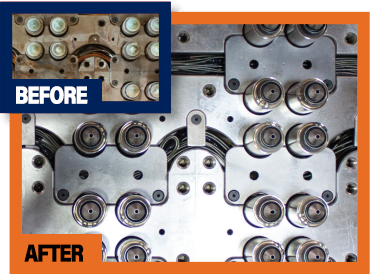Mastering Hot Runner Leak Prevention: Strategies for Long-Term System Integrity
Leaks within a hot runner system can lead to operational inefficiencies, safety hazards, and significant financial losses. Knowledge of how to identify, prevent, and resolve leaks while extending the lifespan of your hot runner components through proper maintenance and trusted suppliers, is crucial to operational efficiency.
Leak Prevention in Hot Runner Systems
Leak prevention is critical because hot runner leaks don’t just lead to minor product flaws—they can destroy tooling, contaminate molds, and halt production lines. Leaks are typically caused by mechanical stress, thermal cycling, improper installation, or worn-out components. The molten polymer can flow into undesired areas, harden, and cause further mechanical failures. Over time, this contamination can damage insulation, compromise thermal control, and necessitate complete system teardown and rebuild. Proactively addressing the root causes of leaks ensures consistent part quality, reduces scrap rates, and preserves the longevity of the equipment. Moreover, it reinforces workplace safety and reduces the likelihood of catastrophic system failure. Let’s talk about how to prevent hot runner leaks and ensure production efficiency.
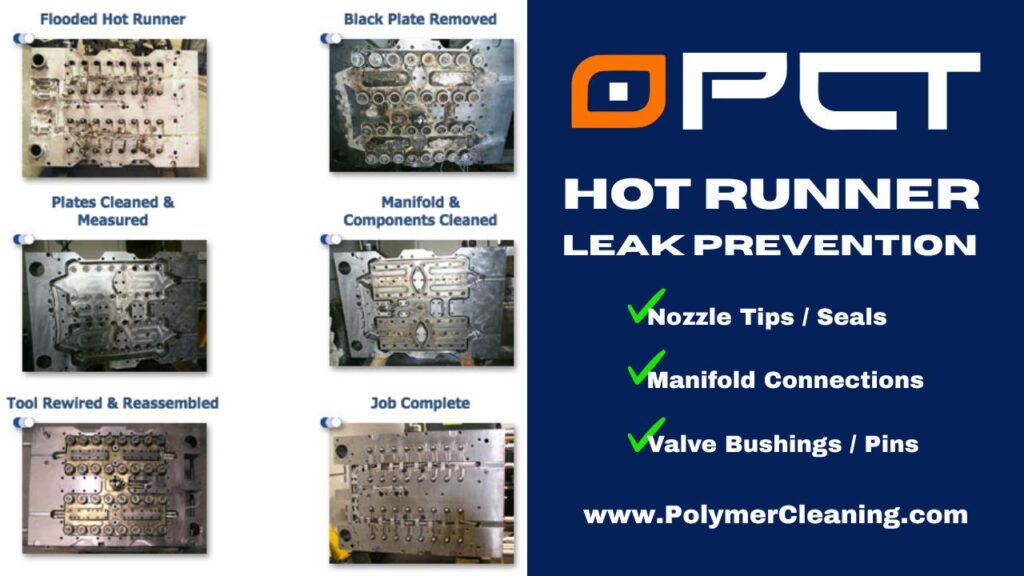
Contact +1 (908) 281-0055 or sales@polymercleaning.com to discuss your Hot Runner Systems today! Experts in Hot Runner System Repair and Maintenance for all OEM.
Common Breakpoints and Causes of Hot Runner Leaks
1. Nozzle Tips and Seals
Nozzle tips are the final contact point before molten plastic enters the mold cavity. Due to high temperatures and constant material flow, they endure significant wear and tear. Damaged or misaligned tips can allow material to leak around the gate. Seals degrade over time, particularly when subjected to repeated thermal cycles or chemical exposure from aggressive polymers. O-rings, crush seals, and gasket failures are among the most common points of leakage in this area.
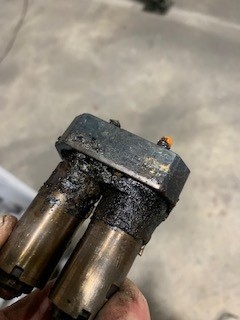
2. Manifold Connections
The manifold distributes molten plastic to various nozzles in a balanced and pressure-regulated manner. Improper tightening, thermal distortion, or poor machining of connecting faces can result in microscopic gaps through which polymer may escape. If not aligned correctly during assembly, these junctions become susceptible to expansion stress, leading to leaks that damage both the manifold and the mold.
3. Valve Pins and Bushings
Valve pins control the opening and closing of gates. When they wear or misalign, they can scrape against bushings or stick in the open/closed position. This affects gate sealing and increases the likelihood of material seepage. Frequent actuation without lubrication or incorrect hydraulic/pneumatic tuning can accelerate this wear.
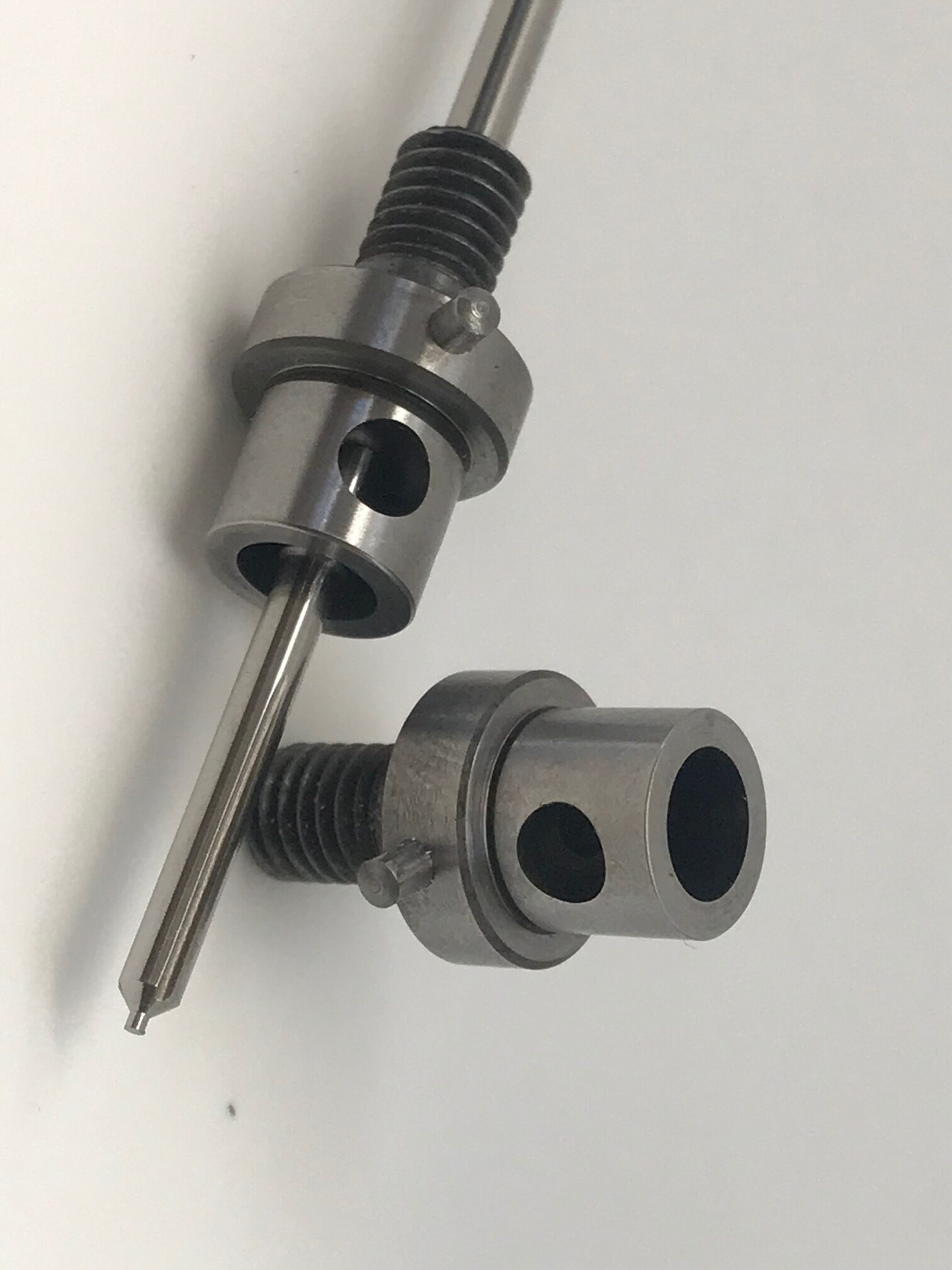
4. Thermal Expansion Mismanagement
All components in a hot runner system undergo thermal expansion. If design tolerances don’t accommodate this, expansion can cause gaps to open at seal points or stress concentrations to form, leading to cracks and leaks. Accurate thermal simulations during design, as well as using matched materials for thermal coefficients, are essential to manage this risk.
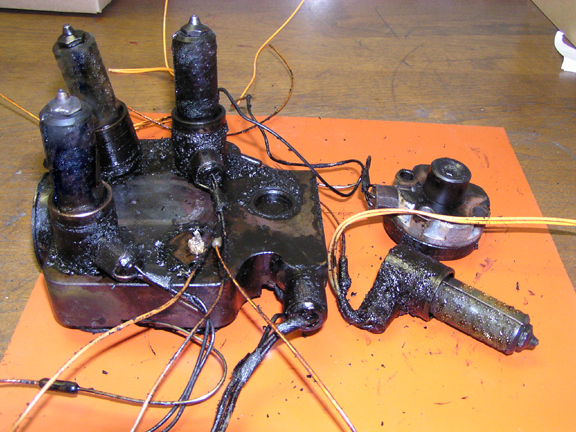
Troubleshooting Steps for Common Causes
1. Regular Inspection and Maintenance
A preventive maintenance plan should include visual inspections, thermal checks, and mechanical integrity testing of all critical components. Maintenance logs help track component lifespan and predict replacement intervals. Inspections should especially target nozzle tips, heater bands, seals, and manifold faces.
2. Monitor Temperature and Pressure
Using embedded thermocouples and pressure sensors, operators can monitor real-time changes in system parameters. Abnormal readings often signal flow restrictions, material buildup, or component wear. Data logging and software analysis tools help detect deviations early, allowing for prompt corrective actions.
3. Proper System Startup and Shutdown Procedures
Rapid temperature changes during startup or shutdown can induce thermal shock, leading to material cracking or misalignment. A ramp-up protocol should gradually bring the system to operating temperature while evenly distributing heat. Likewise, controlled cooldowns prevent component warping and thermal stress.
4. Use of Leak Detection Systems
Advanced hot runner systems now include infrared sensors, pressure transducers, and thermal cameras for early leak detection. These systems can be set to trigger alarms or even halt the machine when parameters exceed predefined thresholds, giving maintenance teams a chance to intervene before failure. These systems can be purchased via upgrades from OEM like Mold-Masters and Husky.
Recognizing Early Signs of Needing Component Replacement
Hot runner systems can be deceptive in masking wear and degradation. Here are the most telling signs that hot runner component replacements may be due:
Increased Cycle Times: Suggests flow channel obstructions or degraded heaters that reduce throughput.
Inconsistent Product Quality: Indicates flow imbalances, nozzle clogs, or misaligned valve gates.
Frequent Maintenance: A component requiring recurring service likely needs replacement. Downtime spent repeatedly addressing the same issue is costlier than preventive part replacement.
Heater Failure or Overheating: Heaters with burned insulation or spotty conductivity can fluctuate in temperature, creating hotspots that affect melt flow.
Using high-quality, OEM-compliant parts reduces the risk of incompatibility and premature wear. Polymer Cleaning Technology is a trusted source for such components, offering reliable replacements tailored to exact specifications. techniques.
Polymer Cleaning Technology: Hot Runner Leak Prevention Experts
Polymer Cleaning Technology (PCT) is a globally recognized supplier specializing in hot runner parts and systems maintenance. Our reputation is built on precision engineering, fast turnaround, and dedicated customer support.
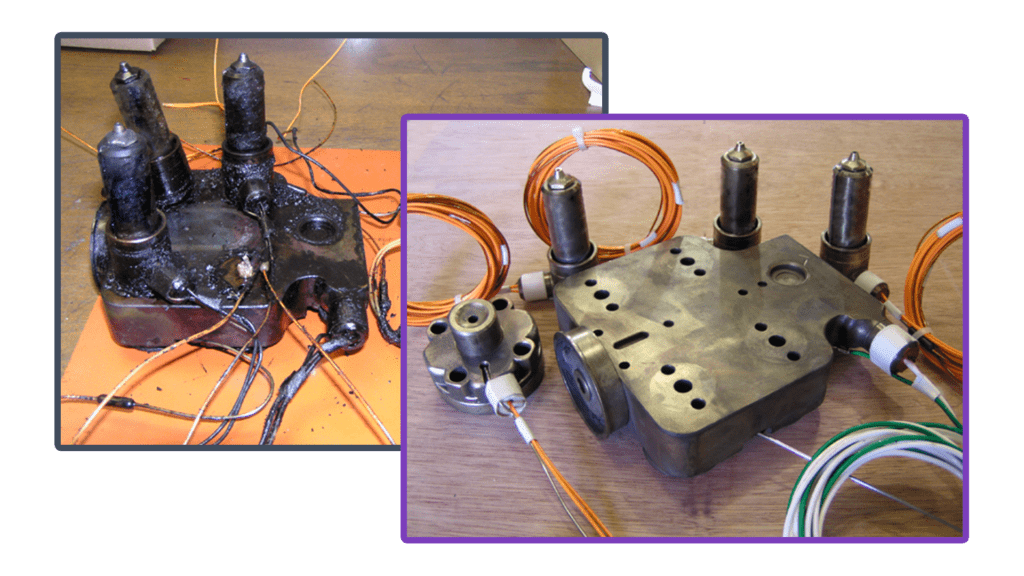
How We Can Help
Wide Inventory of Replacement Parts: Including nozzle bodies, tips, thermocouples, valve pins, heaters, and seal kits for most OEM systems.
Custom Part Manufacturing: PCT can reverse-engineer or design bespoke components tailored to specific mold designs, production goals, or operational challenges.
Leak-Proof Maintenance Services: Offering professional cleaning, inspection, and refurbishment of manifolds and other parts with a leak-free guarantee for up to a year.
Fast Global Distribution: With international logistics support, PCT ensures minimal downtime with rapid delivery of critical parts.
By sourcing from Polymer Cleaning Technology, manufacturers gain a partner committed to system uptime, production quality, and long-term equipment performance.
Leak prevention in hot runner plastic injection molding systems is not a one-time fix but a continuous commitment. By identifying common breakpoints, implementing strict maintenance protocols, using quality parts, and leveraging technology, manufacturers can mitigate risks, maintain productivity, and extend the life of their equipment.
Polymer Cleaning Technology offers a comprehensive solution for companies seeking high-performance replacement parts, custom fabrication, and dependable technical support. With the right strategies and partners, mastering leak prevention becomes not just achievable but sustainable.
*This information is to be used as a general guideline only. Speak to your system manufacturer directly for verified information regarding your Hot Runner System.

Find this information useful? Share with friends & colleagues:
Contact Information:
Polymer Cleaning Technology, Inc.
sales@polymercleaning.com
+1 (908) 281-0055

